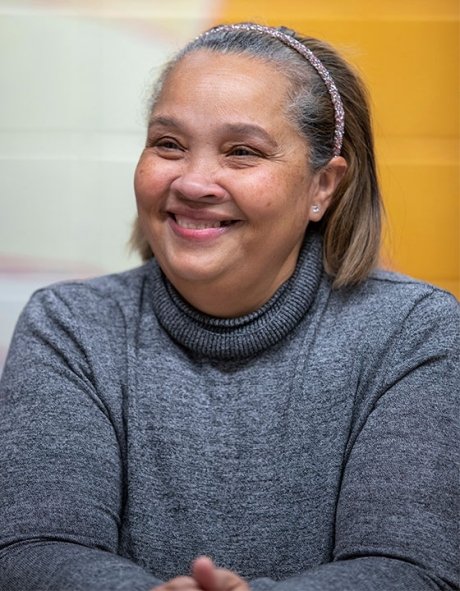RIC Partnership Removes Barriers to a Community Health Worker’s Dream
- News & Events
- News
- RIC Partnership Removes Barriers to a Community Health Worker’s Dream

Upon completion of this unique M.S.W. program, Silvia Adames will become a fully licensed behavioral health counselor.
Two years ago, the School of Social Work partnered with the Executive Office of Health and Human Services (EOHHS) and the Rhode Island Office of the Postsecondary Commissioner (RIOPC) to launch a unique program to remove the barriers that prevent professionals who work in home- and community-based services from earning their M.S.W. degree and becoming licensed social work clinicians – professionals like Silvia Adames.
Adames is a 51-year-old community health worker for Blackstone Valley Community Health Care. Through RIC’s partnership with the EOHHS and RIOPC, she has been able to enroll in RIC’s Master of Social Work program and receive funding for tuition, fees, books and other aid necessary to complete her degree. What’s more, classes are held in the evening so that she can continue her full-time job at Blackstone.
“To have the opportunity to earn my master’s degree is the opportunity I have been waiting for,” she says.
Adames and her family immigrated from the Dominican Republic. She came with an accounting degree but couldn’t practice because of differences in accounting laws in the United States. Adames also could not speak English.
At age 36, she went to work in a factory, taking ESL classes in the evening at the local library. She went on to work in the home- and community-based services sector. Adames became a CNA at a nursing home and found that she loved working with this population.
However, after 15 years, she was injured from lifting a patient, and it ended her career. She was 45 years old. Adames then trained to become a community health worker and landed a job at Blackstone Valley Community Health Care.
“When I heard from my supervisor about this special graduate degree program at RIC, I saw it as an opportunity. The only reason I hadn’t gotten a degree in the 20 years I’ve been in this country is because I couldn’t afford it. My supervisor encouraged me to apply. He said, ‘You’ll make a great counselor because you’re already doing the work, only now you’ll be paid for it.’”
“As a community health worker, I am a bridge between patients and service providers,” she says. “Living on the Southside of Providence, a predominantly Hispanic community, and assisting clients at Blackstone Valley, who are predominantly Hispanic, has been helpful. People feel comfortable talking to someone from their community. They feel freer to tell them about the problems they are facing.”
Among the many issues Adames deals with are human trafficking, domestic violence, homelessness, food insecurity and immigration issues. She is in regular contact with lawyers, law enforcement, physicians and behavioral health counselors at Blackstone Valley Community Health Care.
“It’s good to know that I can use what I am learning at Rhode Island College to help better the lives of the clients I serve,” she says.
Adames admits that going back to school has been difficult. “Because of the language barrier, I couldn’t understand many of the terms in my textbooks nor how to write an AP-style paper, but with the help of my daughters who are college graduates, particularly Jenipher, and the behavioral health clinicians at my job, who look over my assignments, I have been able to succeed. I’ve had four classes so far and I’ve earned A’s in all of them.”
“Silvia brings a wealth of experience to each class and is much appreciated by her colleagues,” notes Assistant Professor of Social Work Lawrencia Okai. “She will be one amazing social worker.”
To find out more about the School of Social Work’s M.S.W. program, contact the M.S.W. program chair:
